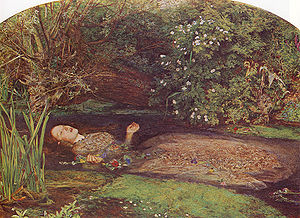Ophelia

Ophelia is a painting by British artist Sir John Everett Millais, completed in 1852. Currently held in the Tate Britain in London, it depicts Ophelia, a character from Shakespeare's play Hamlet, singing before she drowns in a river in Denmark.
The painting depicts Ophelia, a character from Shakespeare's play Hamlet, singing while floating in a river just before she drowns. The scene is described in Act IV, Scene VII of the play in a speech by Queen Gertrude:
- There is a willow grows askant a brook,
- That shows his hoar leaves in the glassy stream;
- There with fantastic garlands did she come,
- Of crow-flowers, nettles, daisies, and long purples,
- That liberal shepherds give a grosser name,
- But our cold maids do dead men's fingers call them:
- There, on the pendent boughs her coronet weeds
- Clambering to hang, an envious sliver broke,
- When down her weedy trophies and herself
- Fell in the weeping brook. Her clothes spread wide,
- And, mermaid-like, awhile they bore her up;
- Which time she chanted snatches of old tunes,
- As one incapable of her own distress,
- Or like a creature native and indu'd
- Unto that element; but long it could not be
- Till that her garments, heavy with their drink,
- Pull'd the poor wretch from her melodious lay
- To muddy death.
The painting is known for its depiction of the detailed flora of the river and the riverbank, stressing the patterns of growth and decay in a natural ecosystem. Despite its nominal Danish setting, the landscape has come to be seen as quintessentially English. "Ophelia" was painted along the banks of the Hogsmill River in Surrey, near Tolworth, Greater London. Barbara Webb, a resident of nearby Old Malden, devoted much time to finding the exact placement of the picture, and according to her research, the scene is located at Six Acre Meadow, alongside Church Road, Old Malden. Millais' close colleague William Holman Hunt was at the time working on his The Hireling Shepherd.
The flowers shown floating on the river were chosen to correspond with Shakespeare's description of Ophelia's garland, however they also reflect the Victorian interest in the "language of flowers", according to which each flower carries a symbolic meaning. The prominent red poppy—not mentioned by Shakespeare's description of the scene—represents sleep and death.
Millais produced Ophelia in two separate stages: he first painted the landscape, and secondly the figure of Ophelia. Having found a suitable setting for the picture, Millais remained on the banks of the Hogsmill River in Ewell—within a literal stone's throw of where fellow Pre-Raphaelite William Holman Hunt painted The Light of the World—for up to 11 hours a day, six days a week, over a five-month period in 1851.
This allowed him to accurately depict the natural scene before him. Millais encountered various difficulties during the painting process. He wrote in a letter to a friend, "The flies of Surrey are more muscular, and have a still greater propensity for probing human flesh. I am threatened with a notice to appear before a magistrate for trespassing in a field and destroying the hay... and am also in danger of being blown by the wind into the water. Certainly the painting of a picture under such circumstances would be greater punishment to a murderer than hanging." By November 1851, the weather had turned windy and snowy. Millais oversaw the building of a hut "made of four hurdles, like a sentry-box, covered outside with straw". According to Millais, sitting inside the hut made him feel like Robinson Crusoe. William Holman Hunt was so impressed by the hut that he had an identical one built for himself.
Ophelia was modelled by artist and muse Elizabeth Siddal, then 19 years old. Millais had Siddal lie fully clothed in a full bathtub in his studio at 7 Gower Street in London. As it was now winter, he placed oil lamps under the tub to warm the water, but was so intent on his work that he allowed them to go out. As a result, Siddal caught a severe cold, and her father later sent Millais a letter demanding £50 for medical expenses.
Comments